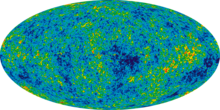
Back معادلات فريدمان Arabic Kainatın Fridman modeli Azerbaijani ফ্রিদমান সমীকরণ Bengali/Bangla Equacions de Friedmann Catalan Friedmann-Gleichungen German Ecuaciones de Friedmann Spanish Friedmanni võrrandid Estonian معادلات فریدمان Persian Fridmanin yhtälöt Finnish Équations de Friedmann French
| Part of a series on |
| Physical cosmology |
|---|
 |

The Friedmann equations, also known as the Friedmann–Lemaître (FL) equations, are a set of equations in physical cosmology that govern cosmic expansion in homogeneous and isotropic models of the universe within the context of general relativity. They were first derived by Alexander Friedmann in 1922 from Einstein's field equations of gravitation for the Friedmann–Lemaître–Robertson–Walker metric and a perfect fluid with a given mass density ρ and pressure p.[1] The equations for negative spatial curvature were given by Friedmann in 1924.[2]
- ^ Friedman, A (1922). "Über die Krümmung des Raumes". Z. Phys. (in German). 10 (1): 377–386. Bibcode:1922ZPhy...10..377F. doi:10.1007/BF01332580. S2CID 125190902. (English translation: Friedman, A (1999). "On the Curvature of Space". General Relativity and Gravitation. 31 (12): 1991–2000. Bibcode:1999GReGr..31.1991F. doi:10.1023/A:1026751225741. S2CID 122950995.). The original Russian manuscript of this paper is preserved in the Ehrenfest archive.
- ^ Friedmann, A (1924). "Über die Möglichkeit einer Welt mit konstanter negativer Krümmung des Raumes". Z. Phys. (in German). 21 (1): 326–332. Bibcode:1924ZPhy...21..326F. doi:10.1007/BF01328280. S2CID 120551579. (English translation: Friedmann, A (1999). "On the Possibility of a World with Constant Negative Curvature of Space". General Relativity and Gravitation. 31 (12): 2001–2008. Bibcode:1999GReGr..31.2001F. doi:10.1023/A:1026755309811. S2CID 123512351.)